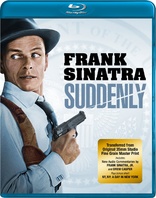Suddenly Blu-ray Movie
HomeSuddenly Blu-ray Movie 
Blu-rayImage Entertainment | 1954 | 77 min | Not rated | Dec 04, 2012
Movie rating
6.8 | / 10 |
Blu-ray rating
| Users | 5.0 | |
| Reviewer | 4.0 | |
| Overall | 4.0 |
Overview
Suddenly (1954)
The tranquility of a small town is marred only by sheriff Tod Shaw's unsuccessful courtship of widow Ellen Benson, a pacifist who can't abide guns and those who use them. But violence descends on Ellen's household willy-nilly when the U.S. President passes through town... and slightly psycho hired assassin John Baron finds the Benson home ideal for an ambush.
Starring: Frank Sinatra, Sterling Hayden, James Gleason (I), Nancy Gates, Willis BoucheyDirector: Lewis Allen
| Film-Noir | Uncertain |
| Romance | Uncertain |
| Thriller | Uncertain |
| Crime | Uncertain |
| Drama | Uncertain |
Specifications
Video
Video codec: MPEG-4 AVC
Video resolution: 1080p
Aspect ratio: 1.38:1
Original aspect ratio: 1.75:1
Audio
English: DTS-HD Master Audio Mono (48kHz, 16-bit)
BDInfo verified
Subtitles
English SDH
Discs
25GB Blu-ray Disc
Single disc (1 BD)
DVD copy
Playback
Region A (C untested)
Review
Rating summary
| Movie | 4.0 | |
| Video | 4.0 | |
| Audio | 3.5 | |
| Extras | 3.5 | |
| Overall | 4.0 |
Suddenly Blu-ray Movie Review
Suddenly Last Epoch
Reviewed by Michael Reuben December 5, 2012For a small film, Suddenly has a lot of baggage. Even after many years, it remains tainted by its eerie foreshadowing of President Kennedy's assassination nine years following the film's release—an association made all the more sinister by the oft-repeated (and now disputed) assertion that Lee Harvey Oswald watched the film shortly before the President was gunned down in Dallas. Then there's the claim that star Frank Sinatra ordered the film withdrawn from circulation after Kennedy was killed, an order Sinatra had no power to give, although he did protest when a TV station aired the film shortly after the 35th President's death. In the Nineties, the film was the victim of a botched colorization effort that turned Sinatra into Old Brown Eyes, and the failure to renew the film's copyright caused it to become available through multiple public domain distributors in inferior versions that were painful to watch. Sinatra could never have predicted the film's twisted path when he surprised everyone by choosing an obscure independent production as the follow-up to his Oscar-winning role in Columbia's big budget From Here to Eternity. But Sinatra had something to prove. After years of playing song-and-dance men, he had been handed an Oscar for a dramatic role, but he still wasn't taken seriously as an actor. Too many people thought he'd simply played himself as Private Maggio in Eternity. Sinatra wanted something so clearly different that there would be no question he was creating a character. John Baron, the former military man planning to assassinate the President of the United States (and mighty pleased about it), was about as far from Private Maggio as any role could be. Suddenly was shot on a no-frills budget over four weeks in a small town outside of Los Angeles. The screenplay was the work of Richard Sale, a screenwriter and occasional director, and also a prolific writer of popular fiction, who understood the art of drawing characters in a few bold strokes. The director, Lewis Allen, had already begun the transition to TV, where his efficient craftsmanship would keep him working for the next twenty years on classic shows like Perry Mason, The Detectives and Bonanza. The result was a spare, tightly wound thriller that would have simply been a small town film noir classic, if it hadn't experienced the good (or possibly bad) fortune of being freighted by history with cultural resonance far beyond anything its creators ever imagined.
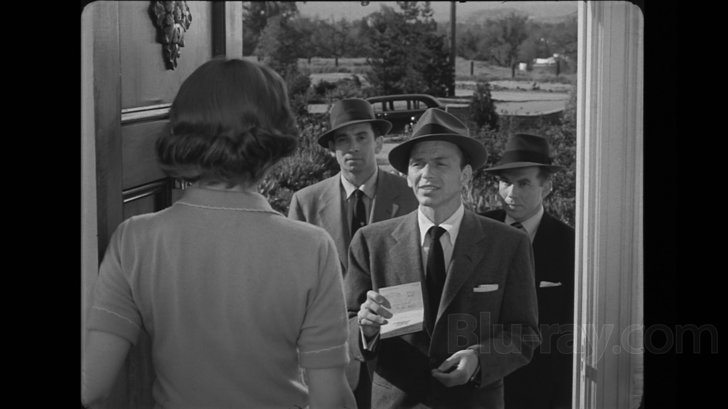
Sale's script bookends the story with a pair of contrasting scenes in which motorists asking directions comment on the peculiarity of a town named "Suddenly". Except for the name, the town is ordinary and peaceful. The chief concern of the Sheriff, Tod Shaw (Sterling Hayden), a veteran of World War II, is overcoming the resistance of Ellen Benson (Nancy Gates), a war widow, to his romantic overtures. Ellen has been a determined pacifist since her husband's death (presumably in the Korean War, although the conflict is never named), and she won't allow her son Peter or "Pidge" (Kim Charney) to see war movies or own a cap pistol. Sheriff Tod tells her she's being unrealistic. "He has to learn that guns aren't always bad, it just depends on who uses them." If you're put off by that style of utilitarian dialogue, then Suddenly isn't for you. It sketches the setting and characters in broad strokes so that it can get on to the real story, which involves a surprise announcement that the President will stop in town on his way to Los Angeles. The Chief Executive will be there just long enough to transfer from a train to a motorcade, but dozens of Secret Service and state police arrive to secure the location. Also arriving are three anonymous men in a nondescript sedan: John Baron (Sinatra), Benny Conklin (Paul Frees) and Bart Wheeler (Christopher Dark). Posing as FBI agents, the three appear at the door of the house where Ellen and Pidge Benson live with Ellen's father, "Pop" (James Gleason). The charade doesn't last for long, though, and the bulk of Suddenly consists of Baron and his cohorts holding the Benson family and, eventually, Sheriff Tod hostage while they await the President's arrival. They've chosen the Benson home, because it overlooks the train station, thereby offering a perfect vantage for an expert marksman to shoot the arriving President with a high-powered rifle. It gives away nothing to reveal that we never learn who's behind the assassination plot. Frank Baron repeatedly brags that he doesn't know who hired him and doesn't care. Suddenly isn't a political thriller so much as an intimate sitdown with one of those evil characters that you'd never want to meet outside the movies. "Don't you have any feelings?" asks Ellen at one point. "No, they were taken outta me by experts", replies Baron. Despite this boast, Baron reveals flashes of feeling, which are even creepier for being unexpected and inappropriate to the situation: hilarity when Pidge catches his associates off-guard; rage when the sheriff hits a sore spot about his past; giddy anticipation as he imagines becoming famous for being the first presidential assassin to get away with it. Just as he'd intended, Sinatra provides a character that is the exact opposite of Private Maggio, but every bit as convincing: cold, remorseless, amoral. As director Lewis Allen follows the star around the Benson household, he still exudes the famous Sinatra charm, but here it's become reptilian. When Baron threatens to kill Pidge, he's entirely credible. Sinatra would continue to show his dramatic range in films like The Man with the Golden Arm, but he would never again play a full-on villain. It's too bad, because, on the evidence of Suddenly, he was good at it.
Suddenly Blu-ray Movie, Video Quality 
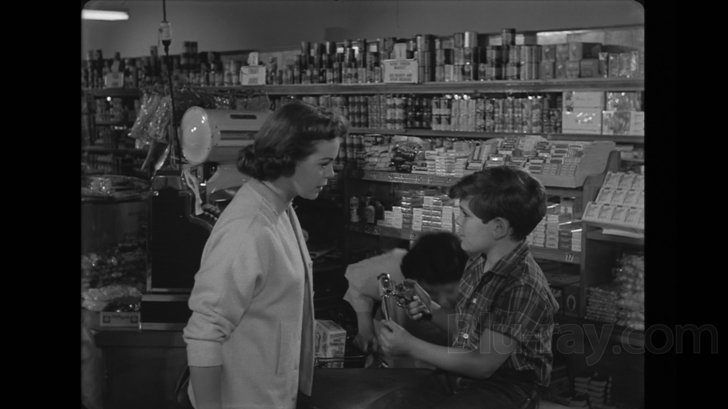
This year has seen the release of two Blu-ray editions of Suddenly, one by HD Cinema Classics and this release by Image Entertainment. I don't have the Cinema Classics disc for comparison, but Image's 1080p, AVC-encoded presentation should render all prior versions obsolete. Described as "transferred from original 35mm studio fine grain master print", the Blu-ray image reflects a remarkably clean source, with only an occasional scratch, blotch, hair and, in one instance, a jump caused by a few missing frames. The clarity of what's there is excellent, with deep blacks and finely delineated shades of gray. Detail may not quite reach the level that could be obtained with a transfer from the original camera negative, but it's more than sufficient to render subtleties of facial expression, costume, decor and the surroundings of the town of Suddenly (actually Saugus, California). The film's grain structure is visible, but as the packaging says, it's "fine grain". Indeed, at points the grain is so fine that one might reasonably question whether some judicious grain removal has been applied. If so, however, the removal has been done without stripping away any detail or leaving any artifacts. Nor have artifacts been added by the compressionist. There seems to be some confusion regarding the correct aspect ratio of Suddenly. Image's presentation is an unmasked 35mm frame (with rounded corners) that measures 1.38:1. IMDb lists the film's original presentation at 1.75:1, which seems unlikely, as that ratio was never a standard in American movie theaters. Suddenly was made in the early years of the film industry's conversion from Academy ratio to its current twin standards of 1.85:1 and 2.39:1. It's most likely that Suddenly was shot for the older "square" format but protected for the newer matted shape. Certainly most of the shots have sufficient extra headroom to allow the film to be matted to 1.85:1 without damaging the narrative. The images "breathe" better, however, at the full Academy ratio. (Neither of the two commentaries addresses the aspect ratio question.)
Suddenly Blu-ray Movie, Audio Quality 
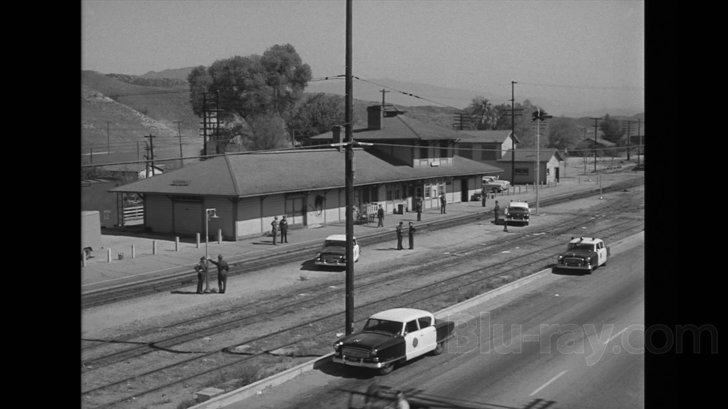
Suddenly's original mono audio track has been provided by Image as lossless DTS-HD MA 1.0, and it sounds quite good. There's little in the way of background noise, no popping or crackling, and the fidelity is impressive. Voices are clear and expressive. The increasingly foreboding train whistles in the background punch through at just the right volumes and frequencies. The ominous score by David Raskin (Two Weeks in Another Town) plays clearly without distortion. The track's only limitation is that the low end is somewhat lacking.
Suddenly Blu-ray Movie, Special Features and Extras 
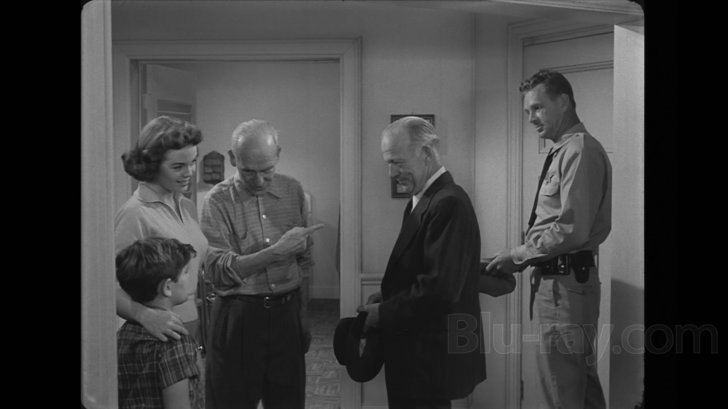
- Commentary by Frank Sinatra, Jr.: Internal references indicate that this commentary was recorded in the latter half of 2012. Sinatra, Jr. was a year older than Kim Charney, who played Pidge, during the filming of Suddenly, and he was present during filming. During one scene, he recalls exactly where he was standing when it was shot. In addition to a history of the film and its participants that is tinged with personal connection, Sinatra situates Suddenly within his father's career and seems to take special delight in the most extreme moments of his performance as a mad dog killer. He also explains the basis for the persistent rumor that the elder Sinatra had the film withdrawn after President Kennedy's assassination.
- Commentary by Dr. Drew Casper, Professor of American Film at the USC School of Cinematic Arts: Casper's commentary is more polished than Frank Sinatra, Jr.'s, and it's denser with academic background and historical context. However, it lacks the personal touch that Sinatra, Jr. contributes and the intimacy of a shared connection. Some of the highlights include Casper's extensive overview of Sinatra's film career before Suddenly and his observations on director Lewis Allen's effective framing.
- Short Film by Francis Thompson, N.Y., N.Y.: A Day in New York (1957) (1080p; 1.33:1; 15:14): Francis Thompson is best known as a co-director of the 70mm short film To Be Alive!, which was shown at the 1964 World's Fair in New York and is credited with inspiring the IMAX format. (Thompson also co-wrote To Fly!, the first feature from IMAX specialty producers MacGillivray Freeman Films.) This wordless collage of images, set to a score by Gene Forrell, captures scenes of 1950s New York refracted through prismatic lenses of Thompson's own design to convey a sense of restless energy even in scenes without motion. Power plants, skyscrapers, bridges and commuters leaving subways are among the representative sights, but they're shown in a way never seen before.
- Image Gallery (1080p): Ten images of marketing materials for Suddenly.
Suddenly Blu-ray Movie, Overall Score and Recommendation 
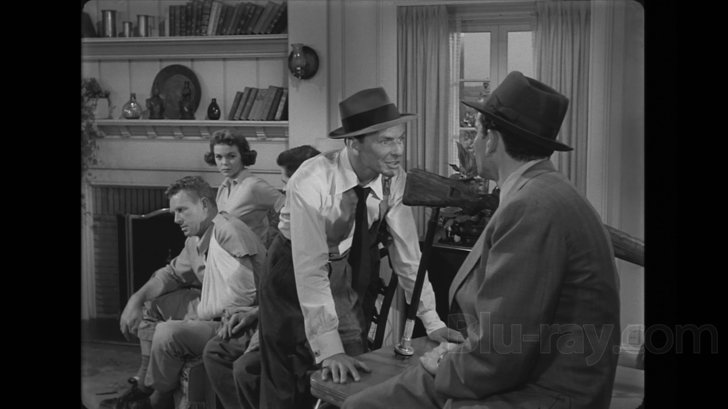
It speaks volumes about the era in which Suddenly was made that so many of the characters find the notion of killing a U.S. President almost impossible to grasp, especially when the would-be assassin turns out to be another American. Screenwriter Richard Sale must have expected a similar reaction from audience members. Under the pretext of having Sheriff Tod Shaw try to talk Baron out of his plan, Sale deftly worked in a conversation about the three previous Presidents who died at the hands of assassins (Lincoln, Garfield and McKinley) and a fourth (FDR) who was a target. The overt point was that all these assassins were caught. The subtext was that men like Baron were nothing new. Today, of course, no such dialogue would be necessary. In the years following the release of Suddenly, events in the U.S. and around the world rapidly expanded the movie audience's notion of what is possible and conceivable until it exceeded even what John Baron might do. Today, audiences readily accept political assassination at the highest levels of public life as a credible plot device, without further need to explain or justify. Some might argue that's not a good thing, but the argument is moot. Like Pidge, we've seen what we've seen. Highly recommended, for both the film and the Blu-ray.
Similar titles
Similar titles you might also like

The Desperate Hours
1955

Thunder Road
1958

The Incident
Limited Edition to 3000
1967

House of Bamboo
Limited Edition to 3000 - SOLD OUT
1955

Gun Crazy
1950

Human Desire
1954

Key Largo
Warner Archive Collection
1948

The Hitch-Hiker
1953

Crashout
Gunmen on the Loose
1955

Journey Into Fear
Warner Archive Collection
1943

Union Station
1950

Highway Dragnet
1954

Fury
Warner Archive Collection
1936

Moonrise
1948

The Night Holds Terror
1955

Down Three Dark Streets
Down 3 Dark Streets
1954

Crime of Passion
1957

The Good Die Young
1954

He Ran All the Way
1951

The Glass Web 3D
1953
